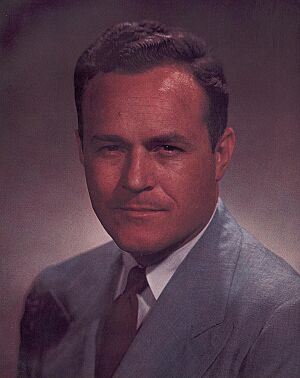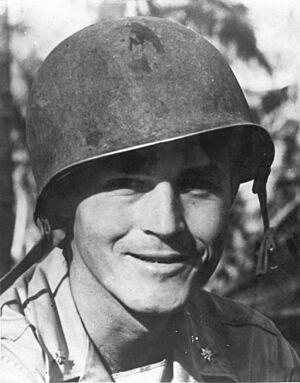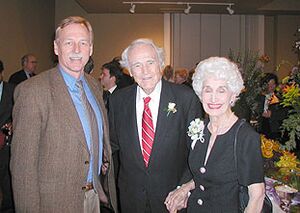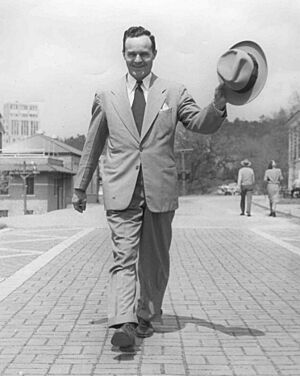Sid McMath facts for kids
Quick facts for kids
Sid McMath
|
|
|---|---|
 |
|
| 34th Governor of Arkansas | |
| In office January 11, 1949 – January 13, 1953 |
|
| Lieutenant | Nathan Green Gordon |
| Preceded by | Benjamin Travis Laney |
| Succeeded by | Francis Cherry |
| Personal details | |
| Born |
Sidney Sanders McMath
June 14, 1912 Magnolia, Arkansas, U.S. |
| Died | October 4, 2003 (aged 91) Little Rock, Arkansas, U.S. |
| Resting place | Pinecrest Memorial Cemetery, Saline County, Arkansas, U.S. |
| Political party | Democratic |
| Spouses |
|
| Profession | Attorney |
| Awards | Silver Star Legion of Merit See more |
| Military service | |
| Allegiance | |
| Branch/service | |
| Years of service |
|
| Rank | Major General |
| Commands |
|
| Battles/wars | World War II
|
Sidney Sanders McMath (June 14, 1912 – October 4, 2003) was a U.S. Marine, a lawyer, and the 34th governor of Arkansas. He served from 1949 to 1953. Even though many powerful people in his state disagreed, he worked hard to bring big changes to Arkansas after World War II.
McMath pushed for things like getting electricity to more homes in the countryside. He also wanted to build many new roads and schools. He helped create the University of Arkansas for Medical Sciences, a major medical school. He believed in fair rules for banks and utility companies. He also worked to get rid of the poll tax, which made it harder for some people to vote. McMath also wanted more opportunities for Black citizens.
He stayed loyal to President Harry S. Truman during a time when some Southern politicians, called "Dixiecrats," disagreed with Truman. McMath even campaigned for Truman in the South. After being governor, McMath spoke out against segregation and Governor Orval Faubus during the Little Rock school crisis in 1957. Later in his life, he became a very famous trial lawyer. He helped many injured people and taught new lawyers. When he passed away, he was the earliest-serving former governor still alive.
Contents
Early Life and Military Service
Sidney Sanders McMath was born in a simple log cabin near Magnolia, Arkansas. His family moved to Hot Springs, Arkansas in 1922. There, his father worked as a barber, and his mother was a manicurist. Sid and his sister, Edyth, went to public schools in Hot Springs. Sid was a great boxer and became an Eagle Scout. He also shined shoes and sold newspapers to help his family. He was elected class president every year in high school and won a state boxing title.
He went to Henderson State College and the University of Arkansas. He was president of the student body at the University of Arkansas. He graduated from law school in 1936.
After college, McMath joined the Marines as a second lieutenant. During World War II, he returned to active duty in 1940. He trained officers and was promoted to captain, then major. In 1942, he led a jungle warfare school in American Samoa. From 1942 to 1944, he fought in the Pacific Theater with the 3rd Marine Regiment. He was part of battles in places like New Georgia and Bougainville. He was promoted to lieutenant colonel and received the Silver Star and Legion of Merit for his bravery.
After the war, McMath continued to serve in the Marine Corps Reserve. He was promoted to brigadier general in 1963 and major general in 1966. He even served two short tours in Vietnam in 1969. In 1967, he helped start the Marine Corps JROTC at Catholic High School for Boys in Little Rock.
Starting a Political Career
In 1946, McMath and other veterans decided to fight against corruption in the Hot Springs city government. At that time, Hot Springs was known for illegal gambling. Criminal groups controlled the city by using fake poll tax receipts to cast many votes. Police officers were often paid by these groups.
McMath led a group called the "GI Ticket." Most of his group won their elections after McMath convinced a judge to throw out the fake poll tax receipts. McMath became the prosecuting attorney for Garland and Montgomery Counties in 1947. The new officials, led by McMath, shut down the casinos and other illegal activities.
Serving as Arkansas Governor

In 1948, McMath won the Democratic election to become governor. He was the youngest governor in the country when he took office on January 11, 1949. He was easily reelected in 1950. During this time, many Southern Democrats left the party because of its stance on civil rights. They supported Strom Thurmond, a "Dixiecrat." But McMath stayed loyal to President Truman and helped him win reelection. McMath and Truman became lifelong friends.
As governor, McMath focused on improving Arkansas. He worked to pave many roads, especially "farm-to-market" roads, to help people travel easier. He also brought electricity to many rural areas. He built a new medical center in Little Rock, which became the University of Arkansas for Medical Sciences. This was paid for by a tax on cigarettes.
McMath also supported African Americans. He appointed them to state boards for the first time. He worked to save the state's all-Black college, now the University of Arkansas at Pine Bluff. He also improved the state's mental health system and raised the minimum wage.
Later Political Challenges
McMath faced strong opposition from powerful energy companies and wealthy bankers. These groups worried that his progressive ideas would increase costs and change the way things were done. They worked together to defeat him when he ran for a third term in 1952.
He also ran for the U.S. Senate in 1954 and for governor again in 1962. In 1962, he almost forced Governor Orval Faubus into a runoff election. The $2 poll tax made it hard for many working-class people to vote. McMath tried to get rid of this tax, but it stayed until 1964.
Career as a Trial Lawyer
After leaving office in 1952, McMath became one of the top trial lawyers in the country. He won many important cases that set new legal rules. For example, he won the first million-dollar personal injury case in a U.S. District Court. He also helped establish that women could sue for the loss of their husband's companionship. His cases made manufacturers responsible for harm caused by faulty products.
McMath and his law partner, Henry Woods, were known for using detailed models and visual aids in court. In 1976, McMath was elected president of the International Academy of Trial Lawyers, a group of the world's best lawyers.
He wrote a book about his life called Promises Kept (2003). It tells about his childhood, military service, and time as governor. The book won several awards for its historical importance.
In 1991, McMath's firm suggested suing tobacco companies to get back money spent on healthcare for smokers. Arkansas officials didn't join, but other states like Florida and Mississippi did. They won billions of dollars. This led to many other states and the federal government winning huge settlements, totaling over $1 trillion.
Later Life and Passing
Sid McMath stayed active into his 90s. He often spoke at schools and events. He supported his old college, Henderson State University, and the University of Arkansas for Medical Sciences. He also helped local groups like the Lions World Services for the Blind. He even completed training there in 1999 after losing his eyesight.
McMath died at his home in Little Rock, Arkansas on October 4, 2003. He was given a full military funeral by the U.S. Marine Corps. His coffin was displayed at the state Capitol. Many people attended his funeral at Pulaski Heights United Methodist Church. Former governor David Pryor said McMath was "the best friend Arkansas ever had." He was buried at Pinecrest Memorial Cemetery in Saline County, Arkansas.
Sid McMath Avenue in Little Rock is named after him. A library branch and a statue of him were also dedicated in his honor. Many awards and scholarships have been created in his name to recognize leadership, courage, and public service.
Sid McMath's Legacy
Historians and journalists have praised Sid McMath's work. Many believe he was one of the most important governors in Arkansas history. His programs built many roads and schools. He also supported civil rights early on, especially by backing President Truman in 1948. He helped open medical and law schools to African Americans in Arkansas. He also pushed for electricity in rural areas.
During the Little Rock Integration Crisis in 1957, McMath urged President Dwight D. Eisenhower to act if Governor Faubus tried to stop school integration. McMath was a strong voice against segregation.
Many people admired McMath's courage. He stood up for what he believed in, even when it was unpopular. He fought against powerful groups and faced political defeat because of his principles. Some say his actions prevented more violence during the civil rights era in Arkansas. His leadership helped Arkansas move towards modernization and racial fairness.
McMath's fight against Middle South Utilities (now Entergy Corporation) was a key part of his legacy. This company, known locally as Arkansas Power & Light (AP&L), tried to stop electricity from reaching rural areas through cooperatives. McMath supported these cooperatives, which helped bring power to many homes by 1956. This fight led to his defeat in 1952.
Allegations of corruption in his highway department were made by his opponents. However, these claims were later proven false in court. McMath always denied any wrongdoing and believed these charges were made to hurt his political career.
McMath also strongly opposed the "Southern Manifesto" in 1956. This document from Southern politicians encouraged resistance to school desegregation. McMath warned that it would "encourage demagogues to set fires of racial hatred." He believed this manifesto gave Governor Faubus the reason to use the National Guard to block Black students from entering Little Rock Central High School in 1957.
Even though McMath served only a few years as governor, his impact was significant. He helped modernize Arkansas's roads and schools. He played a key role in bringing electricity to rural areas. His support for civil rights and President Truman was crucial. He also helped ensure the survival of the University of Arkansas at Pine Bluff and the growth of the University of Arkansas for Medical Sciences.
McMath did not become wealthy or build a huge political machine. But he is remembered for his strong character and dedication to justice. People who knew him often said he made them feel important and inspired. His life showed great courage and a commitment to his beliefs, even when it cost him politically.
Military Awards
| Silver Star | Legion of Merit w/ valor device | Navy Unit Commendation |
| American Defense Service Medal | American Campaign Medal | Asiatic-Pacific Campaign Medal w/ 3 service stars |
| World War II Victory Medal | Marine Corps Reserve Ribbon | Armed Forces Reserve Medal |
In Film
In 2018, it was reported that many old photos from a 1951 film called Wonder Valley were found. Sid McMath played himself as Governor in this movie. The last known copy of the film was too damaged to watch.
See also
- List of governors of Arkansas
- List of members of the American Legion
 | John T. Biggers |
 | Thomas Blackshear |
 | Mark Bradford |
 | Beverly Buchanan |




